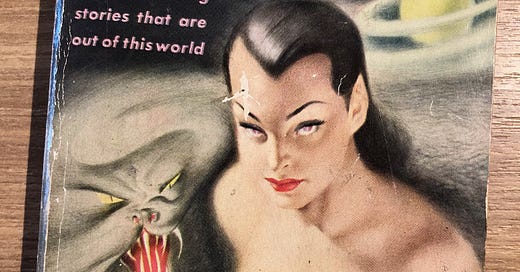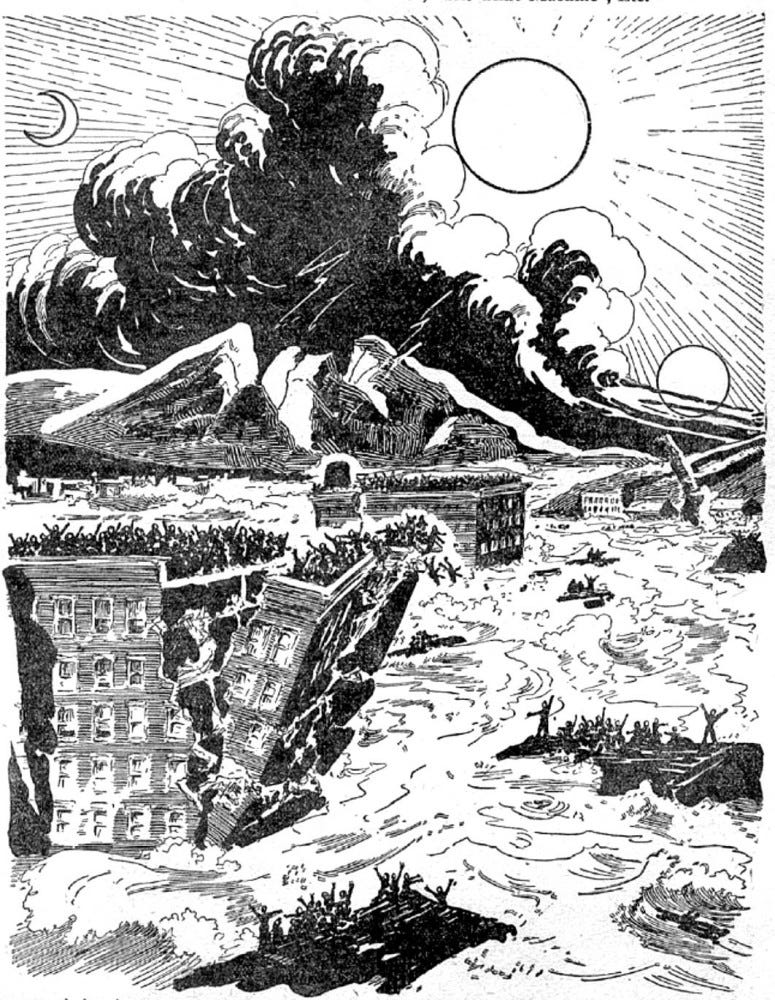"The Star" - H. G. Wells puts a up a mirror for all of us to take a good look at ourselves
We are masters of denialism. Whether its relationships or a global pandemic or climate change, realities can stare right at us and we'll still deny them. We are amazing (and often not in a good way).
I love picking up random stories. Often they're cheap paperbacks on Ebay, and most recently I picked up a mass paperback, nicely worn, printed in 1950 and with a collection of twenty-three short stories - science fantasy, they called them - by known and unknown (to me), authors. Among these twenty-three were Theodore Sturgeon and Leigh Brackett, Robert Heinlein and Jack London, Isaac Asimov, Ray Bradbury, Edgar Allan Poe and H. G. Wells.
Herbert George Wells gave us The Time Machine, The Invisible Man and The War of the Worlds, just to mention the most famous ones. Wells was prolific, oh my, was he ever prolific! - both novels and short stories - so many, and I realize I've never heard of most of them. Well, no matter - that's why I like my 'system' - I don't pile books, I don't feel the need to know everything by this writer of that - I just go with the flow - whatever appears in my world, I'll give it a go. So when this short stories flowed my way, I was thrilled.
I man, seriously - there’s Leigh Brackett (the woman who wrote the screenplays for The Big Sleep and Rio Bravo and many more - including the first draft, get this, of The Empire Strikes Back!). And then there’s Jack London who regaled me with a fantasy tale that was unlike any Jack London I had read before. But I digress (easy to do with so much wonderful material). To 'The Star' - a short story written in 1897 by H. G. Wells. And in just a few pages, Wells shows us who we are.
Here's what happens eventually in 'The Star' - caution would have been advised.
It is about 1900 in Wells’ story, when astronomers notice a bright object appear in our solar system. It’s big, it can already be seen and its gravitational pull is sure to cause trouble. The star actually collides with Neptune and media reports on it and life on Earth goes on as the increasingly bright star comes closer and closer.
If this reminds you of the recent Don’t Look Up - yep, that’s humanity for you. But H. G. Wells was first by a hundred plus years and, admittedly, it’s not as horrifically funny as Don’t Look Up.
Here’s what happens in H. G. Well’s story:
"But you must not imagine because I have spoken of people praying through the night and people going aboard ships and people fleeing towards mountainous country that the whole world was already in a terror because of the star. As a matter of fact, use and wont still ruled the world, and save for the talk of idle moments and the splendor of the night, nine human beings out of ten were still busy at their common occupations. In all the cities the shops, save one here and there, opened and closed at their proper hours, the doctor and the undertaker plied their trades, and workers gathered in the factories, soldiers drilled, scholars studied, lovers sought one another, thieves lurked and fled, politicians planned their schemes.
"The presses of the newspapers roared through the nights, and many a priest of this church and that would not open his holy building to further what he considered a foolish panic ... The master mathematician’s grim warnings were treated by many as so much mere elaborate self-advertisement. Common sense at last, a little heated by argument, signified its unalterable convictions by going to bed. So, too, barbarism and savagery, already tired of the novelty, went about their nightly business: and save for a howling dog here and there the beast-world left the star unheeded."
Here's 'The Star' on the Project Gutenberg site in full - enjoy!
For a while, scientists still think that the star will pass far, far from Earth. But Jupiter’s gravitation changes the scenario and the star comes ever closer, ever fast. Its heat is felt now, ice caps melt and then there are the floods, the earthquakes, the tidal waves, hurricanes and volcanic eruptions. It’s almost as if Wells had watched Roland Emmerich’s 2012 (I’ll admit, I enjoyed that way, way over-the-top disaster movie).
The Star ends up passing Earth on its path to the sun. Life on Earth will never be the same - millions have perished and the remaining masses migrate to the poles where Earth now offers the best living conditions.
Whether it’s Wells’ ‘The Star’ or ‘Don’t Look Up’ or ‘2012’ - it appears our species as a whole prefers to look away, rather than face the realities of a star, a comet, a pandemic - or the twin climate change and biodiversity loss crises … I gotta tell you, I’m not impressed by our species. Not at all.
There are the blissfully ignorant, then there are the millions of willfully ignorant ones, then there are the staunchly virulent deniers (pick anything and they’re against it) … and then there are the billions who actually do know, but are too lulled in realms of comfort and convenience to lift a finger. While individual human beings never fail to amaze with incredible endeavors, with heart and passion beyond the seemingly possible, with determination against all odds, when it comes to the mass of our species, I have no hope.
I have great hope in the few, and in what the few are doing about the restoration of nature in a way that has massive scale and the power to move the billions toward a better path. Here’s to the few, to the crazy ones (as Apple so beautifully put in that iconic commercial of yore.) On that note, I’m outta here.
Cheers,
D





